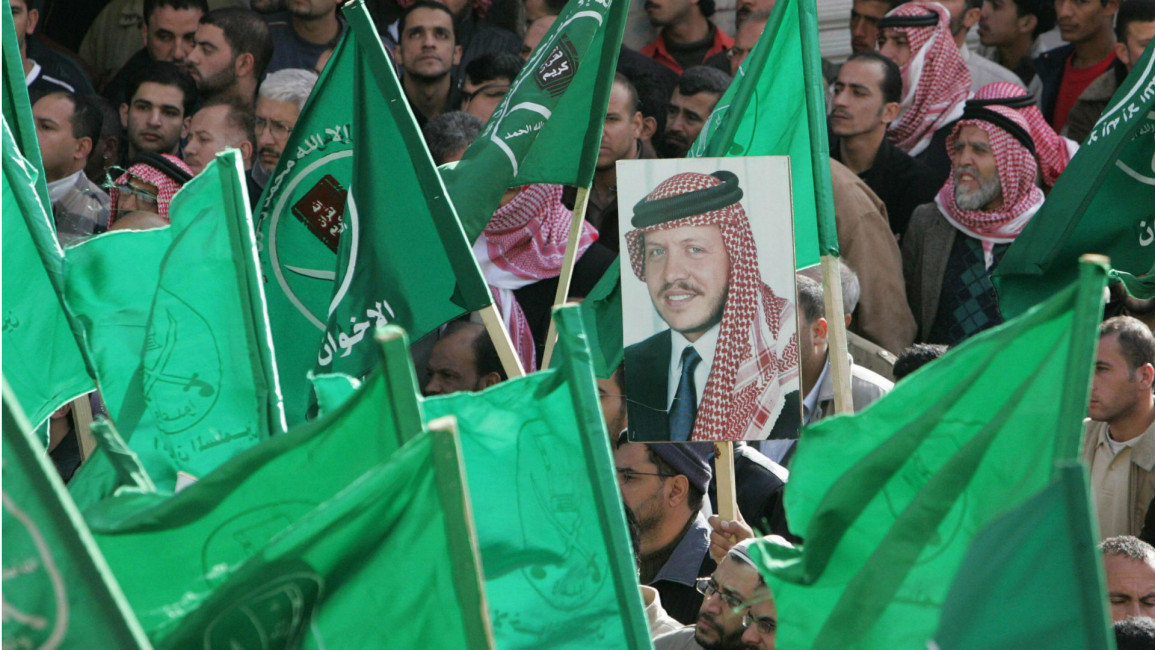
The Brotherhood of Amman comes to blows
The international guidance office of the Muslim Brotherhood has yet to provide a "magical solution" to the unprecedented crisis it is facing in Jordan.
The Istanbul office told visiting Jordanian Brotherhood leaders that the solution must come within the Jordanian group itself.
"The protection of the Jordanian state is a Brotherhood interest," the guidance office reportedly told the visitors.
Jordan is one of the few countries that still allows the Brotherhood to undertake political activities.
Special relationship
Accusations have been flying round social media, with some Brotherhood leaders blaming a supposed security services' conspiracy to destabilise the group and keep it bogged down in internal conflicts.
If we ignore that, one has to assume that Abdul Majid Dhneibat and his group of leading Brotherhood figures were attempting to protect the group's legal status by opting ot re-register the organisation with the state - so it didn't go the same way as its Egyptian counterpart.
However, the result is that we have two groups and two leadership structures, both of which claim to be the legitimate representative of the Muslim Brotherhood in Jordan.
The first group is the original Brotherhood, which has maintained its ranks and continues to enjoy the presence and backing of its core, traditional support base.
Group two is newly registered and has appointed an executive office headed by Dhneibat, with membership drawn from other Brotherhood figures that have since been expelled from the original group.
Although this second group does not have popular support among Brotherhood rank-and-file, or the backing of the movement's "doves" - the group from which most of the splinter faction originated - it has the advantage of being legally recognised and thus having the implicit support of the government.
This makes group two a direct threat to group one's legal status. Ultimately, group one's assets, offices, and funds could be seized through court action.
The new group is essentially the only legally recognised Brotherhood group in the country.
The crisis is ongoing and could go develop along one of two routes, if internal divisions are not resolved.
Two brothers
One potential outcome is that each of the two groups claim to represent the Brotherhood, and its political wing, the Islamic Action Front.
The second scenario is for Dhneibat to pursue the Brotherhood's offices through the courts, in which case the original group will find itself having to operate underground - effectively being banned by the government.
| The new group is essentially the only legally recognised Brotherhood group in the country. |
However, it is still unclear whether the government is keen for this outcome to develop.
Jordanian decision makers are fully aware that Dhneibat's group enjoys only limited popular support, and counts no more than 50 Brotherhood members.
The real weight of the movement remains in the support behind the original group.
This faction boasts 5,000 registered members, in addition to the group's street support. Neither registered members or street supporters are likely to drift towards the new group simply because it has gained "legal legitimacy".
The government is also powerless in swaying the Brotherhood's core supporters towards the new group. It has learned this from previous failed attempts to divide the country's Brotherhood.
Jordanian officials will face serious questions over support of the new Brotherhood if the original group is made illegal.
What will be the fate of the thousands of young Brotherhood members in the original group? What political alternative will be available to the Jordanians of Palestinian descent who support the Brotherhood?
Who will the conservative middle classes follow if the Brotherhood goes underground?
The Muslim Brotherhood is already embroiled in a deep crisis that has reflected on its approval ratings. A recent poll reported that the Islamic Action Front's ratings have slumped from 6.1 to 1.5 percent.
Difficult path
However, there is still hope that the Brotherhood and the enthusiasts in the state might yet listen to the voices that offer a solution to the current crisis: the Brotherhood's religious leaders and traditional nationalist symbols.
Abdul Latif Arabiyat, a former parliamentary speaker, has been suggested as a possible candidate to lead the Brotherhood and negotiate with both the state and Dhneibat to reconcile.
Amman's excuse - that its actions are driven by regional commitments - is not convincing, due to Jordan's distinct history and relationship with Islamist groups.
Furthermore, the regional position regarding the Muslim Brotherhood is also changing due to a rapprochement between Turkey and Saudi Arabia.
This will change the prevailing view that the danger emanating from a Turkish-Brotherhood alliance would be the greatest threat to regimes in the region. This has been the dominant narrative among many in the region since Egypt's military overthrew a Muslim Brotherhood-led government.
This article is an edited translation from our Arabic edition.
Opinions expressed in this article remain those of the author and do not necessarily reflect those of al-Araby al-Jadeed, its editorial board or staff.




